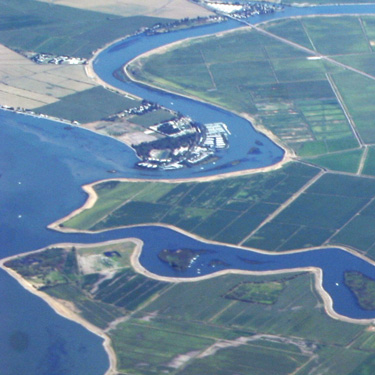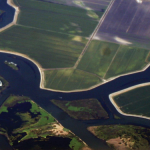Adaptive resource management is widely acknowledged as the de rigueur approach to the management of natural resources. It is a form of structured decision-making that facilitates use of the best available scientific information by resource managers, and it draws approval from the involvement of stakeholders in its design and implementation. So, when the Delta Reform Act of 2009 identified adaptive management as the format and approach to resource management, the State of California showed a commitment to ensuring that the best professional standards of resource-management practice would be used to address the damaged ecosystems and imperiled species in the Sacramento-San Joaquin Delta and adjacent San Francisco Bay.
The Act is anchored by co-equal goals “providing a more reliable water supply for California and protecting, restoring, and enhancing the Delta ecosystem.” The Act established the Delta Stewardship Council and required it to “develop, adopt, and commence implementation of the Delta Plan” and kick-started the effort by adding a requirement in California’s Water Code that the Delta Plan “include a science-based, transparent, and formal adaptive management strategy for ongoing ecosystem restoration and water management decisions.” The Act clarified its intent by defining adaptive management as “a framework and flexible decision-making process for ongoing knowledge acquisition, monitoring, and evaluation leading to continuous improvements in management planning and implementation of a project to achieve specified objectives.”
The Delta Plan that subsequently emerged enthusiastically embraced adaptive resource management, taking its inspiration from beyond the state’s borders. The National Research Council, the National Academies body that advises the nation on pressing matters of scientific importance, observes –
“Adaptive management promotes flexible decision making that can be adjusted in the face of uncertainties as outcomes from management actions and other events become better understood. Careful monitoring of these outcomes both advances scientific understanding and helps adjust policies or operations as part of an iterative learning process. Adaptive management also recognizes the importance of natural variability in contributing to ecological resilience and productivity. It is not a ‘trial and error’ process, but rather emphasizes learning while doing. Adaptive management does not represent an end in itself, but rather a means to more effective decisions and enhanced benefits. Its true measure is in how well it helps meet environmental, social, and economic goals, increases scientific knowledge, and reduces tensions among stakeholders” (NRC 2004).
Adaptive management is a perfect match for the conservation challenges in the Delta – its ecosystems have been greatly altered, native species are in deep decline while non-native species are increasing dramatically, and agency resource managers are uncertain about management responses. The Delta Plan could not have identified a better procedural vehicle for resource managers to employ in their attempt to meet the inspired co-equal goals for the Delta. Adaptive management uses scientific information to shape management-action agendas and as a product of well-designed monitoring.
The Army Corps of Engineers, in its indispensable guidance document A Systems Approach to Ecosystem Adaptive Management, identifies four essential roles for and utilities of science in support of adaptive management informed by structured decision-making —
· Current scientific understanding can be used to help formulate the initial problem statement and planning alternatives as management-relevant hypotheses that can be evaluated through implementation and monitoring.
· Science can be used to translate conceptual models into operational models that in turn can be used to forecast the expected outcomes (benefits, costs, and less-quantifiable risks and benefits) of planning alternatives.
· Implementing management decisions as scientifically rigorous experiments can generate monitoring data and information that can be used to reduce uncertainties associated with future planning.
· Science-based assessments of sensitivity and uncertainty can be used to design monitoring programs that target key sources of uncertainty to improve management capabilities.
Each of those attributes of adaptive resource management are essential elements in crafting and implementing a successful conservation plan for the Delta’s imperiled fishes and their habitats.
Recognizing that the best laid adaptive-management plans can be pulled off track at any point from planning to implementation to assessment, the Delta Plan directly quotes Carl Walters (2007), who cautioned that resource managers would likely encounter impediments to a successful adaptive resource management program. Those impediments include 1) failure of decision makers to understand why adaptive management programs are needed, 2) lack of leadership for the complex process of implementing an adaptive approach, and 3) inadequate funding for the increased ecological (and often economic) monitoring needed to successfully compare the outcomes of alternative polices.
The plan was prescient in repeating those warnings from Walters. What the Delta Plan could not have anticipated was that in implementing the Delta Plan agenda, resource-management agencies would not implement adaptive management as described in the plan, yet at the same time represent to the public that they were doing so.
Ignoring the directions in the Delta Reform Act and Delta Plan for more than a decade, management actions targeting salmon, steelhead, and delta smelt have been implemented without the benefit of adaptive management. State-sponsored management actions targeting listed species in the Delta have not enjoyed the benefits of structured effects analysis, which uses ecological models to select actions from among action alternatives, nor have candidate actions been subjected to risk analysis that assures selected actions can be carried out to maximize benefits to the species and to minimize costs. Resource agencies in the Delta continue to rely on fish survey schemes that could not and cannot provide the data necessary to assess the performance of past and ongoing management actions. The management actions imposed via the ambitious Incidental Take Permit for Long-Term Operation of the State Water Project in the Sacramento-San Joaquin Delta in 2020 continue that trend.
The incidental take permit (ITP) espouses a commitment to adaptive resource management but fails to adhere to the rigors required to carry out that form of decision-making. Appendix J to the ITP defines adaptive management as “a science-based approach to evaluate management actions and address uncertainties associated with those actions to achieve specified objectives and to inform subsequent decision making.”
Well, that’s not quite right. Adaptive management informs both the initial selection of management actions from among alternatives and the subsequent evaluation of the actions selected and implemented. Dependent on the design of rigorous monitoring schema to pick up signals of the performance of the management actions, data from monitoring then is analyzed and assessed periodically to inform adjustments to both the management actions and the monitoring schemes themselves.
Those essential roles for science in adaptive resource management identified in the Corp’s guidance document are not realized in the ITP. Identifying and implementing management actions utilizing adaptive management is a challenging task and the essential roles and applications for science must be incorporated. The stakes for the Delta’s imperiled species and for millions of Californians that rely on water from the Delta could not be higher.
The Delta Stewardship Council though its Delta Science Program has both the expertise and authority to assist the state’s Department of Water Resources and Department of Fish and Wildlife as they struggle to carry out the charge to implement adaptive resource management to save the Delta’s native fishes and equitably allocate Delta’s dwindling freshwaters. Experts in the Delta Science Program surely recognize that that structured decision-making, informed by transparent application of best available science in a risk assessment framework, must accompany implementation of the prescribed actions in the ITP. Intervention by the Council could facilitate the resource agencies and stakeholders working together toward a future in which quantitative decision criteria are identified and monitoring methods meeting professional standards of practice accompany each prescribed management action.
This is a tall task, but one that will contribute to the state meeting the co-equal goals for the Delta — yielding tangible benefits for the ecosystems that support the Delta’s imperiled species, their habitats, and generations of Californians to come.
References
National Research Council. 2004. Adaptive management for water resource planning. National Academies Press. Washington, DC.
Walters, C.J. 2007. Is adaptive management helping to solve fisheries problems? Ambio: A Journal of the Human Environment 36:304-307.
Dennis Murphy has served on the Water, Science, and Technology Board and the Board on Environmental Studies and Toxicology at the National Research Council and on NRC committees reporting on river management issues. He co-authored the NRC’s committee report on Science and the Endangered Species Act. Since 2011, he has served as chair and co-chair of the Independent Scientific Advisory Panel to the nine-state Missouri River Recovery Program’s adaptive management program focusing on operations of the six dams on the Missouri River and the restoration and enhancement of habitat for the river’s listed species.







No Comments